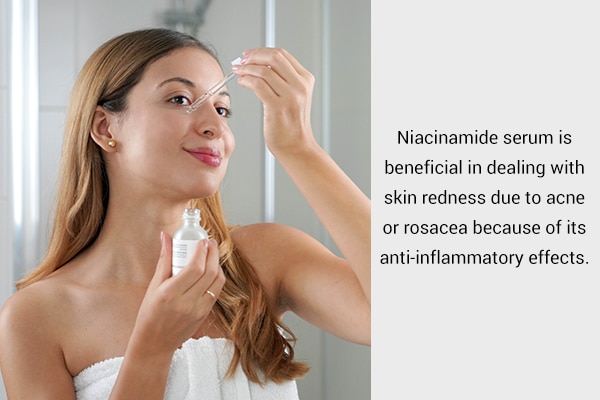Red skin can be disheartening particularly when you can’t find a method to manage it. But did you know adding a good serum to your skin care regimen may be beneficial?

For a lot of people, serums may only be optional products, but they are actually incredible formulations that can help in the upkeep of your skin. Experts explain how using serums can be a good way to beat skin redness.
Read on to know what serums are and how they can alleviate facial redness and irritation.
How Do Serums Work for Skin Redness?
Sensitive skin is described as a syndrome with undesirable symptoms including:
Inadequate skin barrier functioning is believed to contribute to skin sensitivity, which often causes skin redness. To fight this, skin hydration and moisturization are key.
While many serums may contain added ingredients such as glycerin, PEA, and panthenol, the goal is to look at the specific active ingredients that treat skin redness.
As serums may enhance the skin barrier function and resolve erythema, they can be helpful to alleviate skin redness, especially that which is associated with sensitive skin and eczema. (1)
Serums That Work Well for Skin Redness
Here are some serums that can be helpful in treating skin redness.
1. Niacinamide serum

Niacinamide or nicotinamide is useful as a vitamin as its topical application has a stabilizing effect on the skin’s barrier function. It inhibits excessive water loss from the skin, thereby causing an improvement in the skin’s moisture content.
In aging skin, topical use of niacinamide enhances the skin structure by smoothening wrinkles. It may also be beneficial in dealing with skin redness due to acne or rosacea because of its anti-inflammatory effects. (2)
One study showed that topical niacinamide led to improvements in aging facial skin. The study documented that a product containing 5% niacinamide was well tolerated by the skin and provided substantial improvements in: (3)
- Fine lines
- Wrinkles
- Hyperpigmentation spots
- Skin texture
- Red blotches
2. Hyaluronic acid serum
In cosmetic products, hyaluronic acid plays the role of a skin conditioning agent. Hyaluronic acid is largely used in antiaging developments. Hyaluronic acid has the power to improve the level of skin moisture and has a hydrating effect.
Some hyaluronic acid products have been demonstrated to be useful in safeguarding the skin from UV radiation or sun rays.
Hyaluronic acid is also of special importance as topical products containing hyaluronic acid are employed for their healing properties; they decrease skin irritation that may cause redness.
A considerable number of studies have exhibited the efficacy of hyaluronic acid treatment as an anti-inflammatory and an antiaging agent. (4)
3. Azelaic acid serum
Rosacea is a common skin condition defined as a chronic facial inflammatory disorder characterized by constant erythema, inflammatory lesions, and skin redness.
Azelaic acid is a well-established and useful topical agent that treats rosacea because of its antioxidant and anti‐inflammatory effects. It inhibits skin damage by oxidative stress. However, pruritus, burning, and stinging are some of its side effects.
A study proposed that a topical 15% azelaic acid formulation may be a reasonable treatment choice for mild or moderate rosacea. (5)
4. Ceramide serum
Ceramides are lipids that are necessary for a healthy skin barrier. There is enough research that studied the various ceramides found in human skin and their function. Any disturbance in skin ceramide content is associated with skin disorders such as atopic dermatitis, which may cause skin redness.
There are newly developed skin care products that contain ceramides that are used to improve skin barrier function. (6)
Dry skin and redness are pretty common skin issues that can be caused by environmental factors, aging, atopic dermatitis, and eczema. Topical products have been developed to enhance and maintain the skin barrier function and thereby to reduce the aforementioned symptoms.
A single topical application of ceramide, according to one study, resulted in a substantial increase in skin hydration. (7)
Plant-Based Serums That Can Reduce Skin Redness
Plant-based serums have become a popular choice for those dealing with skin redness, as they offer a natural and effective way to soothe and calm the skin.
Here are some plant-based serums that can reduce skin redness.
1. Aloe vera serum
Aloe vera has gained popularity as a natural remedy for various skin conditions, thanks to its anti-inflammatory properties. Its active constituents can help reduce skin redness and swelling, without causing any adverse effects that may harm the skin.
Due to these benefits, aloe vera has become one of the most well-known natural remedies for treating skin redness, making it a go-to option for people looking for safe and effective skin care solutions. (8)
The good news is that many brands have come up with aloe vera serums now that you can use topically to fight skin redness.
2. Neem serum
Neem is a natural remedy that has been found to be effective in reducing skin redness. It contains bioactive phytochemicals that have anti-inflammatory properties and can help alleviate both acute and chronic inflammation.
Studies have shown that neem is even more effective than some nonsteroidal anti-inflammatory drugs such as ibuprofen. This makes neem a promising option for people looking for a natural and safe way to manage skin redness. (9)(10)
3. Tea tree serum
If you suffer from rosacea, you know how frustrating it can be to deal with the redness and inflammation it causes on your face. Fortunately, there may be a solution to this problem that doesn’t involve harsh chemicals or medications.
A recent study has shown that using tea tree-based topical products can be effective in reducing the symptoms of rosacea. The study found that after 12 weeks of treatment, the product containing tea tree significantly improved nontransient erythema (persistent redness of the skin) and reduced itching compared to the placebo group.
These results suggested that a natural and safe tea tree oil serum may be a viable option for those looking to manage their skin redness and inflammation, especially those caused by rosacea. (11)
What Causes Skin Redness?
According to the American Academy of Dermatology Association, several factors may lead to skin redness. These include:
- Sunburn
- Acne
- Hot flashes
- Dermatitis
- Rosacea
- Allergic reaction
- Skin irritation
- Medication side effects (such as that of steroid creams)
- Psoriasis
Other Benefits of Using Face Serums
Here are some of the various benefits that are associated with the use of face serums:
- Face serums are very quickly absorbed by the skin. They are much lighter than moisturizers and have a thinner consistency, so they can usually be used as a base of your skin care regimen. (12)
- Face serums can be used daily without feeling heavy on the face.
- Face serums are usually great for sensitive skin, oily skin, and acne-prone skin. (12)
- Face serums can help in getting rid of or reducing the development of fine lines and wrinkles. (13)
- Face serums can be valuable in controlling signs of premature skin aging caused by exposure to the sun or pollution. (13)
How to Use Serums
It is a must to apply face serums the right way. Follow these steps to properly apply face serums:
- Start with clean skin: Wash your face with a gentle cleanser and pat it dry with a clean towel.
- Apply a small amount of serum: Using a dropper or your fingertips, apply a small amount of serum to your face, focusing on problem areas.
- Gently massage the serum into your skin: Use upward, circular motions to massage the serum into your skin until it’s fully absorbed.
- Wait a few minutes: Give the serum a few minutes to fully absorb into your skin before applying other skin care products.
- Follow up with moisturizer: Apply your favorite moisturizer to lock in the serum and provide extra hydration to your skin.
Who Should Not Use Serums?
Since serums have a very high concentration of the active ingredient, first conduct a simple patch test by using a small amount of the serum on a small area of your arm skin to see if there is any reaction, especially if you have sensitive skin.
If after the test no irritation or skin reaction occurs, you can use the serum. But if you experience redness, inflammation, or other unpleasant effects, do not use the serum. (14)
Most-Asked Questions About Face Serums
When to apply the serum?
The time and frequency of application of serum depend upon the type of serum that you are using.
Antiaging serums are generally the best to be used at night, whereas antioxidant or antipigmentation serums can be used in the morning as they protect your skin from sun damage. Hydrating serums can be applied at night and in the morning to keep the skin healthy and moisturized.
I use toner. Do I need a serum?
Whether you should use both toner and serum depends on your skin goals. If you’re looking for reduced hyperpigmentation, fine lines, and wrinkles, then adding a serum to your skin care routine even if you are already using a toner is a good idea.
Final Word
Several factors contribute to skin redness including irritation, long hours in the sun, and skin conditions such as rosacea. People who have sensitive skin are not new to this problem either. It is a skin issue that can be very bothersome when they face it quite frequently.
The good news is that there are serums that can help keep skin redness at bay! Choose wisely and select the one that works best for you. You can also take advice from your dermatologist about the right product for you.

